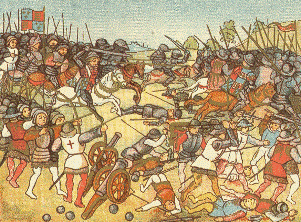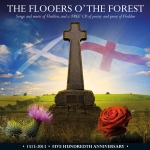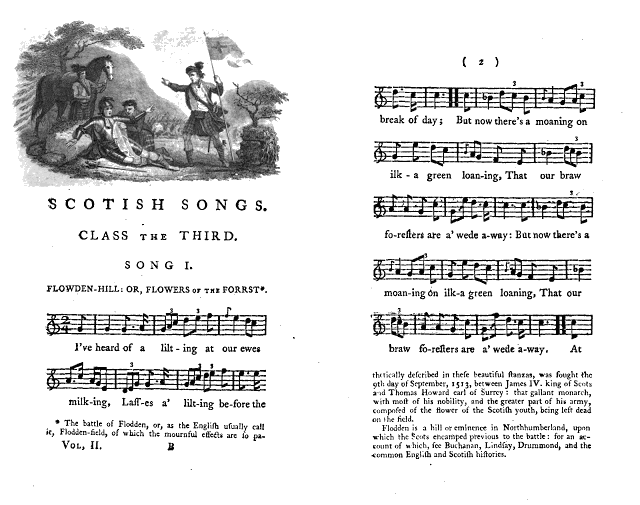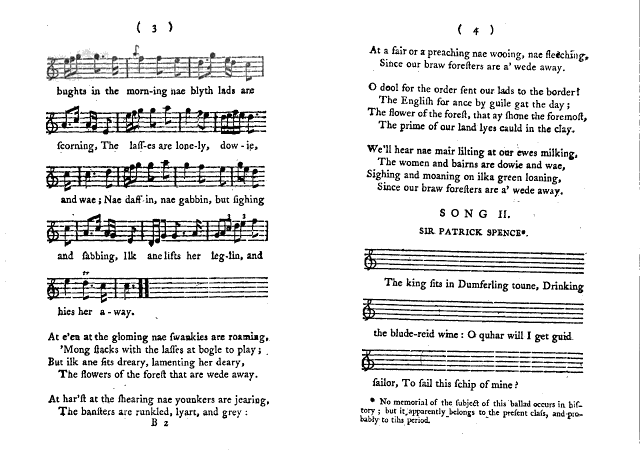

Songs That Made History: 2013 marks the 500th anniversary of the Battle of Flodden Field, Northumberland on 9th September 1513 (www.flodden1513.com), the largest ever battle fought between the two Kingdoms of Scotland and England, ending with the death of the Scottish king James IV and 10,000 countrymen, the proverbial Flowers of the Forest.

Flowers of the Forest is an ancient Scottish folk tune. Although the original words are unknown, the melody was recorded in c. 1615-25 in the John Skene of Halyards Manuscript as "Flowres of the Forrest", though it may have been composed earlier.
Several versions of words have been added to the tune, notably Jean Elliot's lyrics in 1756. Others include those by Alison Cockburn below. However, many renditions are played on the Great Highland Bagpipe. Due to the content of the lyrics and the reverence for the tune, it is one of the few tunes that many pipers will only perform at funerals or memorial services, and only practice it in private or to instruct other pipers.
The tune shown in the manuscript here is a simple modal melody. Typical of old Scottish tunes it is entirely pentatonic, with the dramatic exception of the 3rd and 5th notes of the second line which are the flattened 7th.
THE FLOWERS OF THE FOREST I've heard the lilting, at the yowe-milking, Lasses a-lilting before dawn o' day; But now they are moaning on ilka green loaning; "The Flowers of the Forest are a' wede away". As buchts, in the morning, nae blythe lads are scorning; The lasses are lonely and dowie and wae. Nae daffin', nae gabbin', but sighing and sobbing, Ilk ane lifts her leglen, and hies her away. In hairst, at the shearing, nae youths now are jeering, The Bandsters are lyart, and runkled and grey. At fair or at preaching, nae wooing, nae fleeching, The Flowers of the Forest are a' wede away. At e'en, in the gloaming, nae swankies are roaming, 'Bout stacks wi' the lasses at bogle to play. But ilk ane sits drearie, lamenting her dearie, The Flowers of the Forest are a' wede away. Dule and wae for the order sent our lads to the Border; The English, for ance, by guile wan the day: The Flowers of the Forest, that foucht aye the foremost, The prime o' our land are cauld in the clay. We'll hae nae mair lilting, at the yowe-milking, Women and bairns are dowie and wae. Sighing and moaning, on ilka green loaning, The Flowers of the forest are all wede away.Listen to The Flowers of the Forest from: Simon Chadwick The Eighteenth Day of May Dick Gaughan Isla St. Clair
Watch The Flowers of the Forest from: Simon Chadwick Fairport Convention Fairport Convention Dick Gaughan KiltedCrankie Isla St. Clair
Jean Elliot (b. 1727), aided in part by popular poetry selections, framed the tune in 1756 as a lament to the deaths of James IV, many of his nobles, and over 10,000 men - the titular "Flowers of the Forest" - at the Battle of Flodden Field in northern England in 1513, a significant event in the history of Scotland.
She published it anonymously and it was at the time thought to be an ancient surviving ballad. However, Burns suspected it was an imitation, and together with Ramsay and Sir Walter Scott eventually discovered its author.
The song, written in Scots, is also known as The Floo'ers o' the Forest (are a' wede away) and describes the grief of women and children at the loss of their young men. In some ways the song echoes the Old Welsh poem Y Gododdin about a similar defeat in about 600.
Powerful solo bagpipe versions of the song are used at services of remembrance, funerals, and other occasions; many in the Commonwealth know the tune simply as "The Lament" which is played at Remembrance Day or Remembrance Sunday ceremonies to commemorate war dead.
The first verse of the song contrasts happier times with grief at the losses:
The song is mentioned in The Scots Musical Museum as The flowres of the Forrest, and the air (or tune) apparently survived, but several versions of the words were written down later, the most usual being by Jean Elliot published about 1755.
In 1765 the wit and socialite Alison Cockburn published her lyrics to the Flowers of the Forest beginning "I've seen the smiling of Fortune beguiling" said to have been written before her marriage in 1731. It concerns a financial crisis that had ruined the fortunes of a number of the Selkirk Lairds. Later biographers, however, think it probable that it was written on the departure to London of a certain John Aikman, with whom Alison appears to have had an early attachment.
The first verse runs
Both versions of the song are part of the traditional music at Selkirk Common Riding which in part commemorates the loss at Flodden. Jean Elliot's version is known in the town as "The Liltin" and is played after the Casting of the Colours ceremony. Alison Cockburn's version is played as a march by the town band but is also the version more often sung; it is the version known in Selkirk as "The Flo'ers o' the Forest".
 This album follows in the footsteps of spectacular Greentrax
[46]
albums com- memorating in songs key historical events such as The Battle of Prestonpans [43],
World War I and the Spanish Civil War
[49].
It marks the 500th anniversary of the The Battle of Flodden, which took place in 1513 in Northum- berland, and saw the Scots under James IV fight and lose against the English under Henry VIII.
This album follows in the footsteps of spectacular Greentrax
[46]
albums com- memorating in songs key historical events such as The Battle of Prestonpans [43],
World War I and the Spanish Civil War
[49].
It marks the 500th anniversary of the The Battle of Flodden, which took place in 1513 in Northum- berland, and saw the Scots under James IV fight and lose against the English under Henry VIII.
I found this compilation of 15 songs (new and older) not quite as moving or engaging as previous Greentrax historic compilations. There is still plenty of good stuff on here - I particularly enjoyed Robin Laing's "The Ears of the Wolf" (specifically recorded for this compilation), Karine Polwart's beautiful "Sorrowless Fields" which leans more on American songwriting style, and the pop style song "Flodden Field" by Steve McDonald.
As a bonus, the album comes with a second CD of poetry and prose about Flodden, read by Iain Anderson, John Sheddon and Alastair McDonald.
[Michael Moll]
Various Artists, The Flooers O’ The Forest.
Greentrax Recordings, 2013 (2 CDs).
In late 1942, according to the late Duchess of Windsor's Memoir, The Duke of Windsor asked that it be played at the funeral of his brother, the Duke of Kent, who was killed in a plane crash in the Scottish Highlands. Apparently it was a personal favourite of Prince George, Duke of Kent.
The song is heavily referenced in the novel Sunset Song by Lewis Grassic Gibbon.
The song is quoted at the beginning and end of the historical novel The Flowers of the Forest by Elizabeth Byrd, which culminates in the Battle of Flodden.
It is the official lament of the Canadian Forces, played to honour fallen soldiers.
The English folk-rock band Fairport Convention covered the song on their 1970 album Full House.
The tune was played by a lone piper at the funeral of singer songwriter Sandy Denny.
Scottish tenor Kenneth McKellar recorded a version of the song.
Scots/Australian singer-songwriter Eric Bogle refers to "Flowers of the Forest" in his song "No Man's Land", in which he muses over the grave of a World War I soldier, and wonders whether "Flowers of the Forest" was played at the soldier's burial.
Australian singer-songwriter Graham Dodsworth recorded a version of the song with Irish/Australian singer Claire Peters on his 1998 folk music album 'In Good King Arthur's Day'.
Michael Nyman sped up and re-edited the song as part of the score of The Piano.
English musician Mike Oldfield covered the song on his 1996 album, Voyager.
The track 'Flowers of the Town' by the English folk band The Unthanks is based on this song but it laments the loss of young men in the First World War. The lyrics of this version are almost identical to the first of "Two Songs" by Cecil Day-Lewis.
In the short story "Flowers" by Robin Jenkins, teacher Miss Laing calls the soldiers flowers - a reference to the song.
In 2007, Scottish singer Isla St Clair was invited to sing Flowers of the Forest at Tyne Cot Cemetery in Flanders, Belgium to commemorate the 90th anniversary of the Battle of Passchendaele, in the First World War. The ceremony was attended by Queen Elizabeth II and the Queen of the Belgians, as well as other European Heads of State and Commonwealth Representatives. She also recorded the lament in 1998, for the album When the Pipers Play and again in 2011, for the Scots Guards album From Helmand To Horse Guards.
It is standard practice in the British and Canadian military to use this tune to mark the death of a soldier in Afghanistan during the official memorial service.



Text is available under the Creative Commons Attribution-ShareAlike License.
Date: September 2013.
Photo Credits:
(1) Flodden Field: from Alfred J. Church, The Chantry Priest of Barnet, 1885,
(2) Various Artists: The Flooers O’ The Forest,
(3)-(4) Flowden Hill or Flowers of the Forrst: Ritson, Scotish Songs Vol. II, 1794
(unknown/from websites).